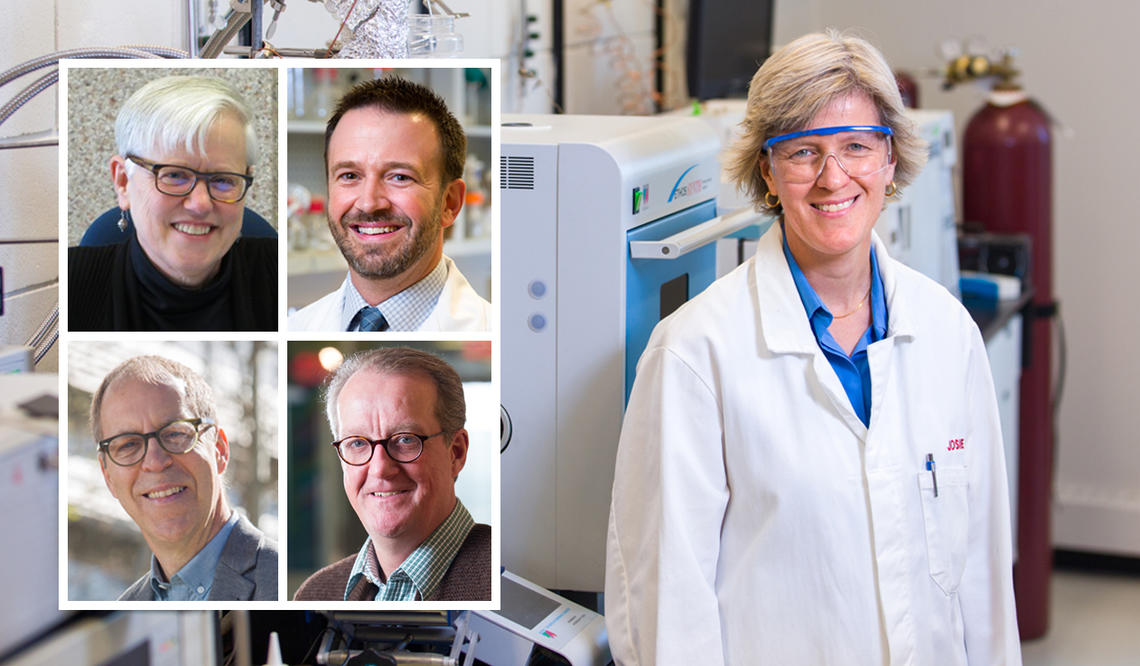Oct. 2, 2017
Five professors receive prestigious Killam awards

From top left: Susan Bennett, Michael Kallos, Josephine Hill, Bernhard Mayer, and David Hodgins.
University of Calgary
Five University of Calgary faculty members have been awarded the prestigious Killam Annual Professorship. Killam Annual Professors are selected for demonstrating excellence in research and teaching for 10 years or more, while serving their academic discipline and their community outside the university. Recipients are nominated by the dean of their faculty and selected through peer review. Killam Annual Professors are awarded to nationally or internationally recognized faculty members.
The 2017 Killam Annual Professors at the University of Calgary are:
- Susan Bennett (Faculty of Arts)
Bennett’s work in the areas of Shakespeare and early modern English drama have made her a sought-after speaker internationally at venues that span the Shanghai Theatre Academy to more obvious Shakespearean venues such as the Shakespeare Institute in Stratford-upon-Avon and the Globe Theatre in London, England.
The Killam award comes on the heels of Bennett being inducted last year into the Royal Society of Canada as a Fellow of the Academy of the Arts and Humanities, one of Canada’s highest distinctions for scholars. Performance and Shakespeare are two important themes of her research, which examines contemporary cultural, artistic and literary practices. Considering the early modern period to the contemporary era, she examines how performance can influence the way we conceive gender, economics, art, culture and the self.
- Josephine Hill (Schulich School of Engineering)
Hill is a leading researcher in the field of catalysis and chemical engineering. Having taught at the Schulich School of Engineering since 2002, Hill has mentored hundreds of undergraduate and graduate students. She is the Canada Research Chair in Hydrogen and Catalysis, and leads the Laboratory for Environmental Catalytic Applications.
She has received the Engineers Canada Award for the Support of Women in the Engineering Profession in 2013, the inaugural Women in Engineering and Geoscience Champion Award from APEGA in 2012, the 2008 Minerva Mentoring Award and the 2007 Mentor of the Millennium from Alberta Women’s Science Network.
Hill is also involved in promoting awareness of the challenges that women face with Women in Science and Engineering (WISE) — a university-wide organization dedicated to supporting and encouraging women who are interested or engaged in science or engineering careers — and as faculty liaison for the Cybermentor Program for girls in grades 8-12.
- David Hodgins (Faculty of Arts, Cumming School of Medicine)
Hodgins is recognized as an international authority in gambling and addiction studies. He also leads the Addictive Behaviours Laboratory, a centre of activity for graduate students and postdoctoral scholars. His studies on directions for treatment of gambling disorder have resulted in development of an evidence-based Brief Treatment for Gambling Disorder, a treatment used in many U.S. states that has also influenced treatments in Australia, Singapore and other countries.
His focus on natural recovery and the study of the precipitants of relapse to problem gambling, as well as the evaluation of brief interventions, has influenced the theory of pathological gambling and the practice of gambling treatment.
- Michael Kallos (Schulich School of Engineering, Cumming School of Medicine)
Kallos has won numerous awards for his teaching from UCalgary students and the Department of Chemical and Petroleum Engineering. His main area of research is stem cell bioprocess engineering. It is part of a broader field of regenerative medicine. His lab is addressing this bottleneck by taking stem cell discoveries and developing tools and technologies to make them available for the public. One of the projects he’s working on with a UCalgary colleague in veterinary medicine, Jeff Biernaskie, involves looking at developing a stem cell and biomaterial solution that would help burn patients who need skin grafts.
During Kallos’ own rising career trajectory at UCalgary, his first significant research contribution was a major bioengineering breakthrough, being the first to demonstrate in 2006 that the large-scale growth of a certain type of stem cell in bioreactors is possible. This is important because large numbers of cells are required for the development of therapies and treatment of multiple patients. Cell production is a significant bottleneck that bioreactors can play a significant role in solving.
- Bernhard Mayer (Faculty of Science)
Mayer is one of the world’s leading experts in isotope hydrology and isotope geochemistry.
He now uses chemical and isotopic fingerprinting techniques to trace compounds in the environment including contaminants. While his laboratory work often applies advanced technologies with the goal of reducing environmental impacts of anthropogenic activities, his style of teaching is hands-on, encouraging experiential learning on a personal level.
Mayer has been instrumental in the development of isotope tools and research programs that help to assess the environmental impacts of many anthropogenic activities, including the agricultural and energy sectors. His Applied Geochemistry research group uses chemical and isotopic techniques to trace water, carbon, nitrogen, phosphorous and sulfur compounds in surface and subsurface environments.
His work reaches around the globe, including projects in South Korea and Europe to help determine solutions for remediating contaminated groundwater.
Over the course of his career, he has trained 82 highly qualified personnel. In the past 10 years, he has trained eight postdoctoral scholars, five PhD students, 18 thesis-based and two course-based MSc students and eight undergraduate students, as well as a nine research associates and assistants.
The Professorship term started July 1, 2017 and will continue for one year. Killam Annual Professors will each receive a $10,000 prize from the Killam Trusts. Find more information at the Killam Trusts.
